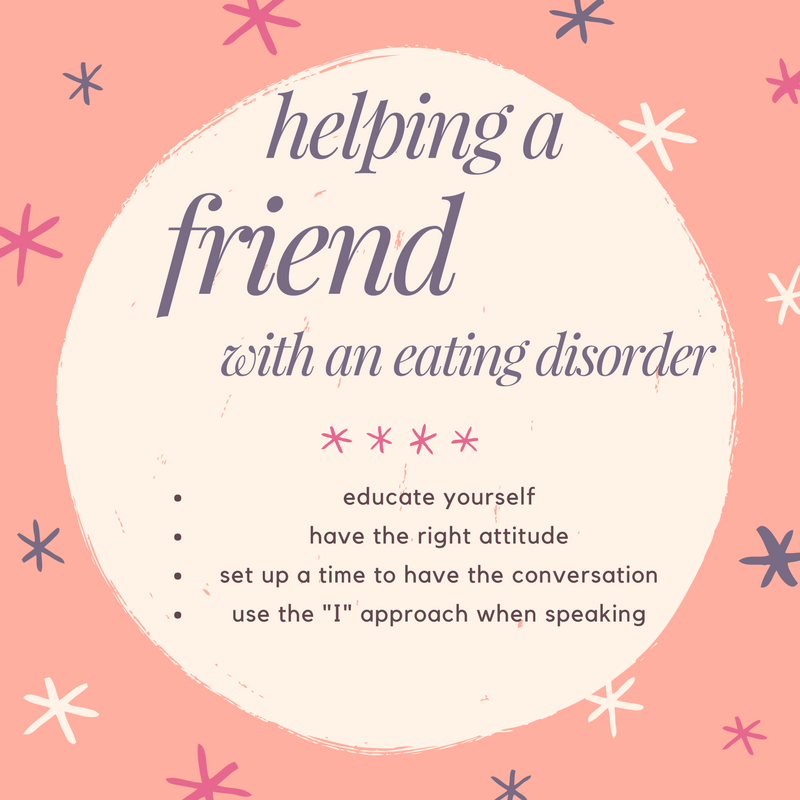
How can you help a friend with an eating disorder?
You’re worried about your friend and you’ve seen the signs: excessive drop in weight over a short period or appearing “gaunt”, talking obsessively about food (and this is a new topic rather than someone who has always appreciated food or can be considered a “foodie”), excessive exercise, and constantly skipping meals or vomiting.
Now, I will point out that an eating disorder can go both ways. The person can either be obsessed with food and lose too much weight, or can use food as a coping mechanism that causes weight gain and other health issues. For this article, I will focus solely on the disorders that are caused by a desire to lose weight, with another article in the future to focus on the disorders that are caused by food acting as a coping mechanism.
Have the right attitude
If you are concerned about a friend or a family member and see the need to bring up the conversation about it (after all, NOT saying anything can enable the issue) then the first thing you can do is put yourself in the right mindset about what you can do before you set up a conversation. For example, are you thinking that you feel responsible for this person’s behavior? Drop this idea, because it can backfire terribly. The best attitude is to go into the conversation knowing that you are not responsible for fixing them- maybe you are their best friend or spouse or sister, but just don’t try to fix them. You don’t know why they are dealing with this problem, and since it tends to be very complex with a lot of moving parts, then assuming that you know the answer could push that person away. So, understand that your role is to be a friend, confidant, and support system. That doesn’t mean that you have to chip in to the problem (for example, if they ask you to pick up a bunch of laxatives), but it does mean that your job is to help them understand that you love and care about them without trying to take control of their life.
Educate yourself about eating disorders
If you are going to have a conversation about it, don’t assume that you know everything about it. In fact, during the conversation it may benefit you to admit this fact: “I don’t diagnose eating disorders, but I do know that I have noticed that you refuse breakfast and lunch and I feel concerned about it.” However, having some information would be helpful so that you can add some substance to explaining your feelings about it. Look at credible websites that end in .gov or .org for the best and most recent information.
Set up a time to have the conversation
Okay, you don’t have to send them a google calendar invitation that reads “conversation with sally about her possible eating disorder” but maybe you can plan on a short trip where you can talk to them in the car or somewhere else that would be away from crowds of people who can overhear the conversation. This would not be an appropriate situation for an “intervention” or to pounce on them when they are around friends and family. Take a subtle approach, and do your best to make sure the timing is right. They may need to hear what you feel you need to say very soon, but if you get too eager and start making comments or posing concerns when they aren’t in a good place to hear it, then they may completely shut you out.
During the conversation use the “I” approach
This is a great approach for almost all difficult conversations, but especially in this conversation when your loved one is going to feel vulnerable and possibly upset about what you have to say. Avoid telling the person what they are doing wrong or what they need to be doing instead. Avoid shaming, blaming, or attacking in any way. Tell your loved one that you love them and that you are there for them. Say something like, “I feel worried when you skip meals” or “I am feeling anxious about your exercise right now.” This shifts the conversation from blaming them or condemning them to helping them see how their choices affect other people. Avoid superlatives like “always” or “never” as these words elicit defensiveness instead of openness.
Avoid commenting on what their body looks like or preaching to them about their choices. Don’t offer ultimatums or even solutions- these rarely work. Offer to be a person they can call on when they need someone and make sure they understand that you are their friend regardless.
Eating disorders affect millions of people a year and are not gender or lifestyle specific, so this information should hopefully help you if you are feeling concerned about a loved one or friend.
Lifeline Connections is determined to be the kind of place that you can leave feeling uplifted and ready to take on the challenges you’ve faced with confidence, tools, and a lot of people who care about your success and freedom from drugs or alcohol. If you are looking for a place that can take on the whole you, then this is the right place. Located in the Vancouver, WA and Portland, OR area, we offer one on one customized care, so you can assure to be heard in your desires and goals for recovery. Please feel free to email or call us with any questions you may have and we look forward to hearing from you.
Phone: 360-397-8246 ext. 7580
Email: [email protected]
